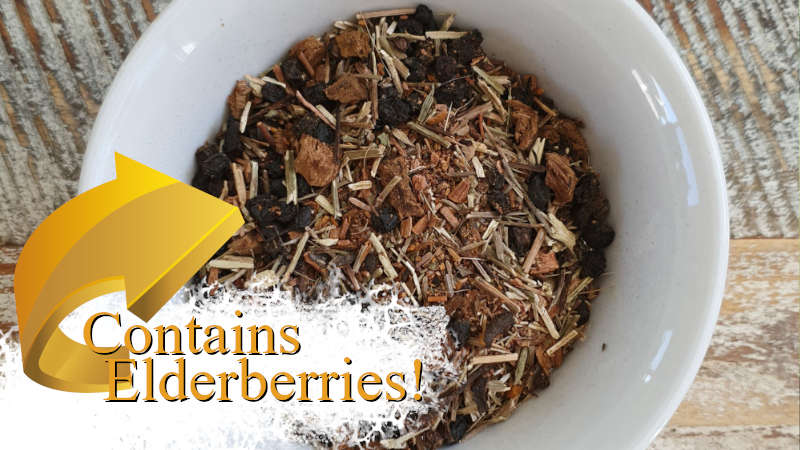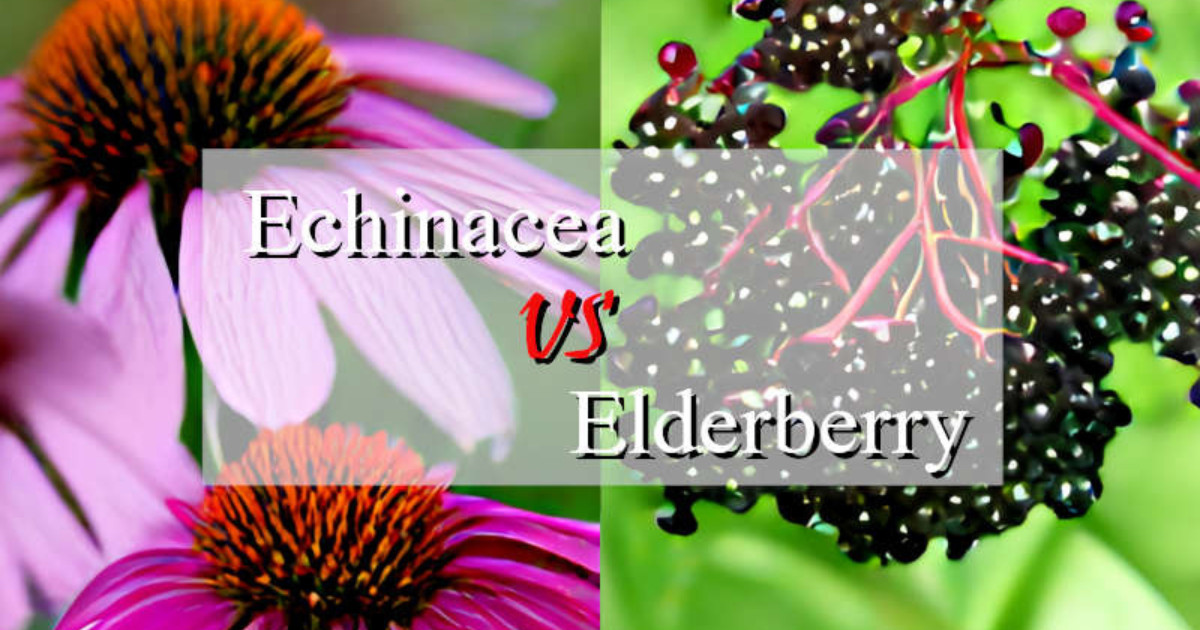Let’s consider the elderberry vs echinacea debate and see if there is any reason why you would want to isolate one from the other or combine their powers to fight off whatever nasties you’re dealing with.
Table of Contents
What’s Better, Elderberry or Echinacea?
This might upset some of the elderberry vs echinacea combatants out there, particularly if you’ve chosen a specific side. But the truth of the matter is that elderberry and echinacea are both herbs that have long histories or traditional uses to support various aspects of the human body.
As they have different mechanisms of action and may be used for different purposes, it is not accurate to say that one is definitively “better” than the other. This is because the effectiveness of these herbs can vary from person to person, and also depends on the specific condition being treated.
Elderberry is a popular herbal remedy for colds and flu. It is believed to work by decreasing inflammation and inhibiting the growth of certain viruses. Elderberry is usually taken as a syrup, extract, or tea.
Echinacea is another herb that is often used to support the immune system. It is thought to stimulate the production of white blood cells, which help the body fight off infections. Echinacea is available in various forms, including fresh (if you’re lucky enough to be able to grow your own, or are in the right part of the world), dried, capsules, tinctures, and teas.
To figure out which is possibly the most suitable for your needs, let’s take a look at some of the differences. Remember, you’ll still need to speak with a qualified specialist about suitability for your needs if these are being considered as a part of a treatment plan.
What is the Difference Between Elderberry and Echinacea?
As elderberry is known for its anti-inflammatory properties, while echinacea elderberry is known for the immune support it delivers, the elderberry vs echinacea debate becomes more a case of ‘Why choose when you can have both?’ for me.
Let’s consider these a little closer.
The Functionality of Elderberry
Elderberry has been shown to have anti-inflammatory effects, which may be due to its high content of flavonoids, a type of plant compound with antioxidant properties. 1
The exact mechanisms by which elderberry reduces inflammation are not fully understood, but some studies have suggested that it may inhibit the production of pro-inflammatory molecules, such as cytokines, and stimulate the production of anti-inflammatory molecules. 2
Elderberry may also have immune-boosting effects, as it has been shown to stimulate the production of immune cells and increase the activity of certain immune system proteins. These effects may also contribute to the berry’s ability to reduce inflammation. 3
It is worth noting that while elderberry has been shown to have some anti-inflammatory effects in laboratory and animal studies, more research is needed to determine its effects in humans. 4
The Functionality of Echinacea
Echinacea is a herb that has been traditionally used to support the immune system. It is thought to stimulate the production of white blood cells, which help the body fight off infections. 5
Echinacea may also have immune-boosting effects by increasing the activity of certain immune system proteins, such as:
- Interferon
- Interleukin-1, and
- Tumor Necrosis Factor (TFN).
These proteins play important roles in the immune system, helping to defend the body against infections and other types of damage.
Interferon
Interferon is a type of protein that is produced by the body in response to viral infections. It helps to inhibit the replication of viruses and stimulate the production of immune cells. 6
Interleukin-1
Interleukin-1 is another type of protein that is produced by the immune system. It plays a role in inflammation and the immune response to infections. 7
Tumor Necrosis Factor (TNF)
TNF is a protein that is involved in the immune response to infections and other types of tissue damage. It helps to stimulate the production of immune cells and promote inflammation. 8
It is worth noting that while echinacea has been shown to increase the activity of these proteins in laboratory and animal studies, more research is needed to determine its effects on immune system proteins in humans.
Some studies have suggested that echinacea may help reduce the severity and duration of colds and flu, although the evidence is mixed. 9
It is worth noting that while echinacea has been shown to have some immune-boosting effects in laboratory and animal studies, more research is needed to determine its effects in humans.
Can I take Echinacea and Elderberry Together?
Can you mix echinacea and elderberry? There are no known interactions which makes the elderberry vs echinacea discussion more of a level playing field. 10
You should be able to take them together, providing that neither of them will interfere with existing medication you may require, or you don’t have allergies to either of them. This is one of those ‘seek specialist advice’ moments.
Combining echinacea and elderberry syrup may, therefore, provide you with two ways in which to combat a nasty cold. There are also elderberry and echinacea supplement options if this is more your thing. But, make sure you look into what else is being bundled up with these.
As there is very limited evidence, if any at all, to suggest that these two conflict with each other, taking them together may be the way to go. Hopefully, that has helped with the ‘Can you take elderberry and echinacea together?’ question. But you’ll still need to speak with an expert for your specific needs.
What are the Elderberry and Echinacea Benefits?
Ok, so this is where the rubber meets the road from many people in the elderberry vs echinacea debate. Where is the real value in these two? Let’s take a look at some of the echinacea and elderberry benefits.
Elderberry Potential Benefits
Some of the potential benefits of elderberry include:
- Cold and flu symptom relief
- Elderberry is often used to help reduce the severity and duration of cold and flu symptoms, such as fever, cough, and muscle aches. Some studies have suggested that elderberry may help to reduce the severity of these symptoms, although the evidence is mixed. 11
- Immune system support
- Elderberry has been shown to stimulate the production of immune cells and increase the activity of certain immune system proteins. These effects may help to boost the immune system and protect against infections. 12
- Antioxidant properties
- Elderberry is high in flavonoids, a type of plant compound with antioxidant properties. Antioxidants help to protect the body against damage caused by harmful substances called free radicals. 13
- Inflammation reduction
- Elderberry has been shown to have anti-inflammatory effects, which may be due to its high content of flavonoids. Inflammation is a natural response to injury or infection, but chronic inflammation can contribute to the development of certain health conditions. 14

Echinacea Potential Benefits
Some of the potential benefits of echinacea include:
- Cold and flu symptom relief
- Echinacea is often used to help reduce the severity and duration of cold and flu symptoms, such as fever, cough, and muscle aches. Some studies have suggested that echinacea may help to reduce the severity of these symptoms, although the evidence is mixed. 15
- Immune system support
- Echinacea is thought to stimulate the production of white blood cells and increase the activity of certain immune system proteins, which may help to boost the immune system and protect against infections. 16
- Anti-inflammatory effects
- Echinacea has been shown to have anti-inflammatory effects, which may be due to its high content of plant compounds called polysaccharides. Inflammation is a natural response to injury or infection, but chronic inflammation can contribute to the development of certain health conditions. 17
Elderberry and Echinacea Side Effects
What are some of the echinacea and elderberry side effects?
Elderberry
Some of the potential side effects of elderberry include:
- Allergic reactions
- Elderberry may cause allergic reactions in some people, particularly those who are allergic to other plants in the same family (such as grasses, ragweed, and daisies). Symptoms of an allergic reaction to elderberry may include hives, rash, itching, and difficulty breathing. 18
- Nausea and vomiting
- Elderberry may cause nausea and vomiting in some people. 19
- Diarrhea
- Elderberry may cause diarrhea in some people. 20
- Interactions with medications
- Elderberry may interact with certain medications, including blood thinners, diabetes medications, and immune-suppressing drugs. It is important to speak with a healthcare professional before taking elderberry if you are taking any medications. 21
Echinacea
Some of the potential side effects of echinacea include:
- Allergic reactions
- Some people may experience allergic reactions to echinacea, particularly those who are allergic to other plants in the same family (such as daisies, chrysanthemums, and marigolds). Symptoms of an allergic reaction to echinacea may include hives, rash, itching, and difficulty breathing. 22
- Nausea and vomiting
- Echinacea may cause nausea and vomiting in some people. 23
- Diarrhea
- Echinacea may cause diarrhea in some people. 24
- Interactions with medications
- Some medications may conflict with echinacea, such as blood thinners, medications that suppress the immune system, and medications that are metabolised by the liver. It is important to speak with a healthcare professional before taking echinacea if you are taking any medications. 25
6 Essential Elderberry vs Echinacea FAQs
Is Echinacea the Same as Elderberry?
No. Elderberry and echinacea are both different things from different plants.
Is Elderberry or Echinacea Better for Colds?
Which do you choose? Elderberry or echinacea for colds? Or both? Which is better?
In the elderberry vs echinacea debate, it is more a case of what they can do together rather than as separate natural sources of relief to conditions. Many people find that their combined benefits outweigh their functionalities in isolation.
Why Should You Not Take Elderberry Every Day?
There is no specific reason why you should not take elderberry every day. Elderberry is generally considered safe when taken in appropriate amounts. However, like all supplements, it is possible to experience side effects when taking elderberry and taking it every day may increase the risk of these side effects.
Additionally, taking elderberry every day may interfere with certain medications or underlying health conditions. It is always important to speak with a healthcare professional before taking any supplement to ensure it is safe and appropriate for you.
There is no specific recommended daily amount of elderberry for adults, and it is not clear what constitutes a “too much” amount. However, taking large amounts of elderberry may increase the risk of side effects, such as nausea, vomiting, and diarrhea.
The real concerns with elderberries being consumed frequently is typically connected to the presence of sambunigrin in elderberries. Consider the potential impacts of having too much exposure to sambunigrin as referenced in Are Elderberries Poisonous? 3 Important Facts.
What is Elderberry and Echinacea Good for?
As we have explored in the elderberry vs echinacea discussion, there are benefits in looking at these as a combined approach.
Together they are relied upon for cold and flu treatment owing to their immune-supporting properties, and their anti-inflammatory effects.
However, you must consider your specific needs in consultation with a specialist first.
Is Elderberry and Echinacea Safe During Pregnancy?
Regardless of the talk about elderberry vs echinacea, it is not recommended to take these during pregnancy unless specifically advised to do so by a healthcare professional.
There is limited research on the safety of them during pregnancy, and it is not clear whether these herbs are safe for use by pregnant women.
Some studies have suggested that elderberry may be safe when taken in appropriate amounts, but more research is needed to confirm this.
Echinacea has not been well studied in pregnant women, and it is not known whether it is safe for use during pregnancy.
As always, qualified specialist advice is necessary. Nothing provided here is to be construed as a substitute for seeking appropriate support to meet your specific needs. What we aim to do is expand on the scope of conversation so we can all learn something more.
Who Shouldn’t Take Echinacea?
If you are on medication to control blood flow, such as certain thinners, or have allergies to specific plants in this family, then avoiding echinacea is a wise move.
Conclusion
After peaking behind the curtain a little, it is now hopefully a little easier for you to see where value can be found for you in these two natural wonders.
As this is not a case of ‘either or’ in my opinion, the elderberry vs echinacea debate has little steam when you consider that together they are extremely effective, and have been relied upon, individually and together, for generations.
References
- “Elderberry and Elderflower Extracts, Phenolic Compounds, and Metabolites and Their Effect on Complement, RAW 264.7 Macrophages and Dendritic Cells” – G. T. T. Ho, H. Wangensteen, H. Barsett, March 2017 [PubMed] [Archive] ↩︎
- “Elderberries as a potential supplement to improve vascular function in a SARS-CoV-2 environment” – J. Festa, H. Singh, A. Hussain, M. D. Boit, 3 February 2022 [Wiley] [Archive] ↩︎
- “A new high-quality elderberry plant extract exerts antiviral and immunomodulatory effects in vitro and ex vivo” – C. Schöna, Y. Mödinger, F. Krüger, C. Doebis, I. Pischel, B. Bonnländer, 6 September 2021 [Taylor and Francis] [Archive] ↩︎
- “Inhibition of microglial activation by elderberry extracts and its phenolic components” – A. Simonyi, Z. Chen, J. Jiang,Y. Zong, D. Y. Chuang, Z. Gu, C. H. Lu, K. L. Fritsche, C. M. Greenlief, G. E. Rottinghaus, A. L. Thomas, D. B. Lubahn, G. Y. Suna, 2 March 2015 [PubMed] [Archive] ↩︎
- “Echniacea” – Mount Sinai Staff, Last Checked 4 January 2023 [Mount Sinai] [Archive] ↩︎
- “Interferon” – Britannica Editors, 16 December 2022 [Britannica] [Archive] ↩︎
- “The role of interleukin-1 in general pathology” – N. Kaneko, M. Kurata, T. Yamamoto, S. Morikawa, J. Masumoto, 6 June 2019 [BCM] [Archive] ↩︎
- “How Does TNF Cause Inflammation?” – H. Cristol, C, DerSarkissian, 30 August 2022 [WebMD] [Archive] ↩︎
- “Can Echinacea Help You Fight the Common Cold?” – R. Link, J. Kubala, 6 December 2019 [Healthline] [Archive] ↩︎
- “Drug Interactions between echinacea and elderberry” – Drugs Staff, Last Checked 4 January 2023 [Drugs] [Archive] ↩︎
- “Is Elderberry an Effective Treatment for Colds and the Flu?” – D. R. Wilson, C. Vandergriendt, 3 February 2021 [Healthline] [Archive] ↩︎
- “Elderberries—A Source of Bioactive Compounds with Antiviral Action” – M. L. Mocanu, S. Amariei, 10 March 2022 [PubMed] [Archive] ↩︎
- “The Physicochemical and Antioxidant Properties of Sambucus nigra L. and Sambucus nigra Haschberg during Growth Phases: From Buds to Ripening” – G. S. M. Petruț, V. Mureșan, R. M. M. Vlaic, C. C. Mureșan, C. R. Pop, G. Buzgău, A. E. Mureșan, R. A. Ungur, S. Muste, 7 July 2021 [PubMed] [Archive] ↩︎
- “Effect of Elderberry Juice on Cognition and Inflammation in Patients With Mild Cognitive Impairment” – D. Q. Beversdorf, 11 May 2016 [NIH Clinical Trails] [Archive] ↩︎
- “Echinacea for preventing and treating the common cold” – M. Karsch‐Völk, B. Barrett, D. Kiefer, R. Bauer, K. Ardjomand‐Woelkart, K. Linde, and Cochrane Acute Respiratory Infections Group, 20 February 2014 [PubMed] [Archive] ↩︎
- “A systematic review on the effects of Echinacea supplementation on cytokine levels: Is there a role in C-19?” – M. Aucoin, V. Cardozo, M. D. McLaren, A. Garber, D. Remy, J. Baker, A. Grattona, M. A. Kala, S. Monteiro, C. Warder, A. Perciballi, K. Cooley, September 2021 [ScienceDirect] [Archive] ↩︎
- “Echinacea purpurea: Pharmacology, phytochemistry and analysis methods” – A. Manayi, M. Vazirian, S. Saeidnia, 5 May 2015 [PubMed] [Archive] ↩︎
- “Type I allergy to elderberry (Sambucus nigra) is elicited by a 33.2 kDa allergen with significant homology to ribosomal inactivating proteins” – E. Förster-Waldl, M. Marchetti, I. Schöll, M. Focke, C. Radauer, T. Kinaciyan, I. Nentwich, S. Jäger, E. R. Schmid, G. Boltz-Nitulescu, O. Scheiner, E. Jensen-Jarolim, December 2003 [PubMed] [Archive] ↩︎
- “Elderberry – Uses, Side Effects, and More” – WebMD Staff, Last Checked 4 January 2023 [WebMD] [Archive] ↩︎
- “Elderberry (Sambucol)” – Everyday Health Staff, Last Checked 4 January 2023 [Everyday Health] [Archive] ↩︎
- “Elderberry” – RxList Staff, 11 June 2021 [RxList] [Archive] ↩︎
- “Adverse reactions to herbal medicines – Echinacea flower” – Allergy Capital Staff, 5 June 2020 [Allergy Capital] [Archive] ↩︎
- “Echinacea” – NCCIH Staff, July 20210 [NCCIH] [Archive] ↩︎
- “Echinacea – Uses, Side Effects, and More” – WebMD Staff, Last Checked 4 January 2023 [WebMD] [Archive] ↩︎
- “Pharmacokinetic and pharmacodynamic interactions of echinacea and policosanol with warfarin in healthy subjects” – M. I. M. Abdul, X. Jiang, K. M. Williams, R. O. Day, B. D. Roufogalis, W. S. Liauw, H. Xu, A. Matthias, R. P. Lehmann, A. J. McLachlan, May 2010 [PubMed] [Archive] ↩︎
Last Updated on 5 months by D&C Editorial Team


